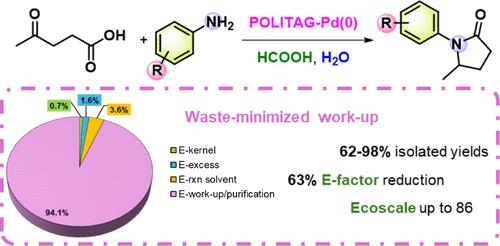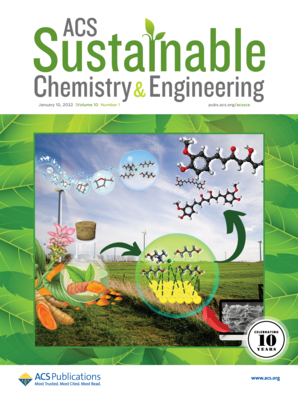Ecofriendly Reductive Amination of a Levulinic Acid Platform Molecule for the Synthesis of 5-Methyl-N-Aryl-Pyrrolidones Exploiting Formic Acid as an LOHC
IF 7.1
1区 化学
Q1 CHEMISTRY, MULTIDISCIPLINARY
引用次数: 0
Abstract
The unsustainable exploitation of fossil feedstocks for energy and chemical production has led, in the past few years, to the modern energy and environmental crisis, thus stimulating increased awareness in the definition of more sustainable alternatives. Among the transformations of biomass-derived levulinic acid, recognized as one of the top 10 platform molecules, the production of 5-methylpyrrolidinones is of great importance in diverse industrial fields. In this work, we defined a waste-minimized protocol for the production of N-aryl 5-methylpyrrolidinones, aiming both at the synergistic employment of a benign H-source and reaction media and at the optimization of the workup and purification step. The choice of formic acid as the hydrogen carrier and water as the solvent was beneficial for the replacement of gaseous hydrogen typically used in the synthesis of N-aryl 5-methylpyrrolidinones. Moreover, the safety and economic advantages of formic acid as a benign LOHC for this transformation were further confirmed by a comparison, with other H-sources, of the Ecoscale penalty points. The optimized extraction workup protocol allowed an E-factor reduction of 63% compared to a simple filtration for purification method. To further evidence the environmental improvement, Ecoscale was exploited, highlighting the benefits of our process in comparison to available literature protocols.

以甲酸为LOHC合成5-甲基- n -芳基吡咯烷酮的乙酰丙酸平台分子的生态还原胺化
在过去几年中,为能源和化学生产而不可持续地开采矿物原料导致了现代能源和环境危机,从而促使人们更加认识到如何确定更可持续的替代办法。在被公认为十大平台分子之一的生物质衍生乙酰丙酸的转化过程中,5-甲基吡咯烷酮的生产在各个工业领域都具有重要意义。在这项工作中,我们定义了一种生产n -芳基5-甲基吡咯烷酮的废物最小化方案,旨在协同利用良性h源和反应介质,并优化预处理和纯化步骤。选择甲酸作为氢载体,水作为溶剂,有利于取代n -芳基5-甲基吡咯烷酮合成中常用的气态氢。此外,甲酸作为良性LOHC在这种转化中的安全性和经济性优势,通过与其他h源的Ecoscale罚分的比较进一步得到了证实。与简单的过滤净化方法相比,优化的提取工艺可使e因子降低63%。为了进一步证明环境的改善,Ecoscale被利用,与现有的文献协议相比,突出了我们的过程的好处。
本文章由计算机程序翻译,如有差异,请以英文原文为准。
求助全文
约1分钟内获得全文
求助全文
来源期刊

ACS Sustainable Chemistry & Engineering
CHEMISTRY, MULTIDISCIPLINARY-ENGINEERING, CHEMICAL
CiteScore
13.80
自引率
4.80%
发文量
1470
审稿时长
1.7 months
期刊介绍:
ACS Sustainable Chemistry & Engineering is a prestigious weekly peer-reviewed scientific journal published by the American Chemical Society. Dedicated to advancing the principles of green chemistry and green engineering, it covers a wide array of research topics including green chemistry, green engineering, biomass, alternative energy, and life cycle assessment.
The journal welcomes submissions in various formats, including Letters, Articles, Features, and Perspectives (Reviews), that address the challenges of sustainability in the chemical enterprise and contribute to the advancement of sustainable practices. Join us in shaping the future of sustainable chemistry and engineering.
 求助内容:
求助内容: 应助结果提醒方式:
应助结果提醒方式:


